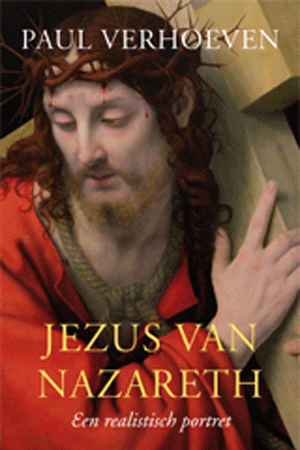Prof. Geurt Henk van Kooten: 'Verhoeven’s Jesus biography is mainly fiction'

Recently, Paul Verhoeven published Jezus van Nazareth. In this biography, Jesus is portrayed by the film producer as a violent and radical revolutionary. Geurt Henk van Kooten, professor of New Testament and Early Christianity at the University of Groningen, thinks that Verhoeven’s book relies too much on speculation. ‘The cinematographer has triumphed over the historian.’
Van Kooten’s first impression of the book was positive. ‘Verhoeven is attempting to create an accurate picture of Jesus by taking a historical approach and referring to a large number of sources and academic discussions.’ However, it wasn’t long before Van Kooten realised that the approach is less historical than first meets the eye. ‘Verhoeven writes that he wants to transform reality into an exciting story. That’s not what a historian does. A historian is unbiased and would not, for example, exclude certain sources for the sake of it. That is what Verhoeven does – he is very selective in what he does and doesn’t use.’
Selectivity
This selectivity is demonstrated, inter alia, by Verhoeven’s decision to ignore the letters of St Paul in the New Testament as a source because their aim was not to describe the life of Jesus – unlike the Gospels, which Verhoeven makes extensive use of. ‘They are letters, so the emphasis is not on historiography. But Paul, who converted a few years after Jesus’s death, knew many of Jesus’s disciples personally. His letters are the oldest Christian source material and definitely reflect the essence of the historical Jesus. One example is that Jesus was not interested in politics.’ Van Kooten does not believe that Paul manipulated the perceptions of Jesus, as claimed by Verhoeven. ‘Why would he do that? If Paul had not agreed with these perceptions he would never have become a supporter, would he?’
Militant rebel
The most significant details of Verhoeven’s book have been paid a lot of attention by the media. For example, that Jesus is the product of the rape of Mary by a Roman soldier during a Jewish rebellion. Van Kooten regards the historical situation of this event in Galilee of the first century AD as not impossible. ‘Thanks to Josephus (a Jewish historiographer), we know the pattern of Jewish rebellions and Roman interventions. However, in Paul we can already read that Jesus was a descendent of David.’ Van Kooten thinks that Verhoeven is way off the mark when he says that Jesus was not a worthy preacher of love of one’s neighbour but a violent, militant rebel. ‘That is the central premise of his book. But there’s nothing there to support it. We know from Josephus that militant movements evaporated as soon as their leaders were executed. That is quite clearly not the case with Jesus. Verhoeven does not explain this. In my analysis, Christianity was consistently an apolitical movement. If Jesus had been a violent revolutionary, then after his death his followers would have to have gone through a monumental change in their way of thinking. Verhoeven casts no light whatsoever on any such process.’
Two swords
Van Kooten does not find the arguments presented by Verhoeven in support of his theory convincing. ‘Luke tells us that Jesus told his disciples to buy two swords. Verhoeven explains this as a call to violence. But Verhoeven doesn’t continue reading. A little later, during his arrest in the garden of Gethsemane, Jesus forbids these swords to be used after a slave of the high priest loses an ear: “No more of this.” This narrative construction is missed by Verhoeven.’ Another important point in Verhoeven’s discussion is that the radicalization of Jesus originated in the martyrdom and execution of his friend Lazarus by the Romans. ‘This apparently made Jesus psychologically unstable and violent. But there’s nothing anywhere in the New Testament about torture. We’re only told that Lazarus was sick. Verhoeven’s assumption is thus pure speculation, as he himself admits, incidentally. His story just doesn’t hold water at crucial points.’
The Da Vinci Code in reverse
Van Kooten’s final assessment is that Jezus van Nazareth is an enjoyable, well-written book, but that’s about as far as it goes. Van Kooten compares Verhoeven’s book with The Da Vinci Code by Dan Brown. ‘Brown’s book is fiction, but he suggests that it might have historical roots. You see the same thing with Verhoeven’s book, but then the other way around – he presents it as history but it turns out to be fiction. Verhoeven wants to tell the story of a sympathetic, anti-institutional Jesus who at a certain point in time changes into a radical revolutionary, but can’t find anything to support this. The cinematographer has triumphed over the historian.’
Curriculum vitae
Prof. Geurt Henk van Kooten (Delft, 1969) became Professor of New Testament and Early Christianity at the University of Groningen in 2006. He was previously a university lecturer at the Faculty of Theology and has also held teaching posts at the University of Amsterdam and at the Protestant Theological University in Kampen. Prof. van Kooten graduated with distinction in theology at Leiden University, after which he went to Durham University on a Rotary Foundation Scholarship (USA) for his Master’s degree. He then went to Oxford University (Christ Church) on a scholarship from the British Academy, supplemented by a grant from the VSB Fund, where he gained the degree Master of Studies. After a position as a research trainee at Leiden University funded by NWO, he gained his PhD in 2001. Van Kooten is an international expert in the field of the relationship between early Christianity and the Graeco-Roman world from which it came forth. In 2008 he became Dean of the Faculty of Theology and Religious Studies.
Contact
Prof. Geurt Henk van Kooten. Telephone: 050 3635584 (work) or 06-12193889 (if there is no answer from the first number).
More news
-
06 January 2026
Connecting with history
